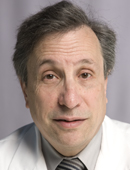#CMSC16 – Dr. Fred Lublin to Deliver Opening Lecture on MS Relapses and Their Impact on Patient Outcomes

The Consortium of Multiple Sclerosis Centers (CMSC) 2016 Annual Meeting will open with the John F. Kurtzke Memorial Lecture, “Do Relapses Really Matter?”, by the renowned multiple sclerosis (MS) expert Dr. Fred D. Lublin of Mount Sinai Medical Center. The June 1 lecture offers a fresh view on recent evidence into the impact of MS relapses on clinical outcomes, and kicks off four days of discussion and insight into MS research and treatment.
 Dr. Lublin is Mount Sinai’s director of the Corinne Goldsmith Dickinson Center for MS, and the Saunders Family Professor of Neurology at the Hospital’s Icahn School of Medicine. He is a neuro-immunologist with a particular interest in immune functions and abnormalities that affect the nervous system. He was the national coordinating investigator for a multi-site clinical trial of combination therapy in MS, a study funded by the National Institutes of Health, and is currently working on a series of clinical research protocols on promising agents for MS treatment. Dr. Lublin is also co-chief editor of the journal Multiple Sclerosis and Related Disorders.
Dr. Lublin is Mount Sinai’s director of the Corinne Goldsmith Dickinson Center for MS, and the Saunders Family Professor of Neurology at the Hospital’s Icahn School of Medicine. He is a neuro-immunologist with a particular interest in immune functions and abnormalities that affect the nervous system. He was the national coordinating investigator for a multi-site clinical trial of combination therapy in MS, a study funded by the National Institutes of Health, and is currently working on a series of clinical research protocols on promising agents for MS treatment. Dr. Lublin is also co-chief editor of the journal Multiple Sclerosis and Related Disorders.
Acute MS relapses are disruptive and traumatic to patients, and often require hospitalization. Even during times of remission MS can stay active, leading Dr. Lublin to consider the clinical manifestations of relapses as likely just “the tip of the iceberg.”
“How relapses influence disease worsening and clinical outcomes in MS over the long term continues to be debated and accurate ways to determine what constitutes a relapse in MS and the severity of relapses have been lacking,” Dr. Lublin said in a press release provided by CMSC to Multiple Sclerosis News Today. “My opening lecture at the CMSC Annual Meeting will provide insight on how with emerging efficacy data, MS care professionals can begin to re-evaluate what is an ‘acceptable’ relapse rate.”
Dr. Lublin has been involved in both basic science and clinical research. Working with colleagues, he was among the earliest researchers in the U.S. to be involved with studies of interferon beta-1b, which was approved by the U.S. Food and Drug Administration (FDA) in 1993 to treat the relapsing-remitting form of MS. He also served as chairman of the National MS Society’s advisory committee on new drug clinical trials and the National Multiple Sclerosis Society’s Research Programs Advisory Committee. Widely published, Dr. Lublin was also a member of the panel that has re-defined the diagnostic criteria for MS.
The CMSC 2016 Annual Meeting takes place June 1–4 at the Gaylord National Resort & Convention Center in National Harbor, Maryland. The event is a singular opportunity for healthcare professionals from diverse areas to learn of the latest developments in MS treatment and research through lectures, workshops, symposia, roundtables, panel discussions, and poster/platform presentations. Nine learning tracks were established by the Professional Education Committee, covering basic science/environmental factors, psychosocial cognition and depression, disease management, symptom management, nursing, rehabilitation, comprehensive care, research, and professional skills development.
Continuing education credits for physicians, nurses, occupational therapists, psychologists, pharmacists, and social workers are open to conference delegates.
Multiple Sclerosis News Today will offer its readers on-site coverage of CMSC 2016, including feature articles, interviews, and social media coverage on Facebook, Twitter, and Pinterest.
CMSC is the leading educational, training, and networking organization dedicated to MS healthcare professionals and research scientists. Its mission is to promote high standards of MS care through programming and accreditation, including live and online events, research grants, technical scientific journals, and targeted advocacy work.






